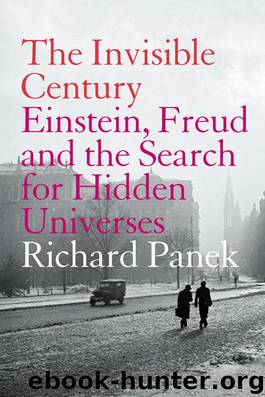The Invisible Century by Richard Panek

Author:Richard Panek [Richard Panek]
Language: eng
Format: epub
ISBN: 9780007503810
Publisher: HarperCollins Publishers
III
THE TREMBLING OF THE DEWDROP
SIX
A DISCOURSE CONCERNING TWO NEW SCIENCES
“What, precisely, is ‘thinking’?”
The question comes early in Albert Einstein’s “Autobiographical Notes,” an essay he wrote in 1946, at the age of sixty-seven. In anyone else’s autobiographical notes, even another scientist’s, the question might have been unusual, but for Einstein it was typical. More than typical, maybe: characteristic; a reflection of who he was at some fundamental level. Again and again over the decades after he had made a name for himself as the father of relativity in a new, non-Galilean sense of the word, in lecture after lecture and essay after essay, Einstein began not with an introduction to the subject at hand but with an overview of how he’d arrived at that subject, or of how scientists in general arrive at subjects in general. Even his most highly specialized scientific papers often opened with a brief account of how he’d come to reach the conclusions that followed. The reason for this narrative strategy wasn’t simply that audiences—even audiences of his scientific peers—needed an expert guide in order to follow the thoughts of an Einstein (though no doubt sometimes they did). It was that for Einstein himself the results of science had become incomprehensible without an understanding of the processes that led to them. When he sat down to compose the essay that would be the closest he’d ever come to an autobiography—or, as he preferred to call it, “something like my own obituary”—he naturally chose to address not the concrete details of who, what, when, and where that usually make up a life story, but the abstract how: his growth as a thinker.
Similarly, Sigmund Freud, in a fragment of an essay he wrote in 1938 at the age of eighty-two, less than a year before his death: The quality of being conscious “remains the one light which illuminates our path and leads us through the darkness of mental life.” But then, Freud had devoted all his life—at least in the nearly half a century since he’d abandoned the formal study of the brain—to the study of the mind. If for Einstein the thought process was a means toward a scientific end, for Freud it was the end. As he wrote that same year, “Every science is based on observations and experiences arrived at through the medium of our psychical apparatus.” But, he continued, “our science has as its subject that apparatus itself”—that is, anyone’s growth as a thinker.
It would be no exaggeration to say that all Einstein and Freud were doing was what philosophers had been doing forever, whether it was Plato positing the existence of ideal forms or Aristotle accepting as real only that which is unquestionably present: thinking about the way we think. Nor would it be an exaggeration to say that they were also doing what the practitioners of one modern variation on that same ancient discipline—natural philosophers, or, as they’d come to be known, scientists—had been doing for the past few hundred years, upon closer
Download
This site does not store any files on its server. We only index and link to content provided by other sites. Please contact the content providers to delete copyright contents if any and email us, we'll remove relevant links or contents immediately.
The Complete Stick Figure Physics Tutorials by Allen Sarah(7361)
Secrets of Antigravity Propulsion: Tesla, UFOs, and Classified Aerospace Technology by Ph.D. Paul A. Laviolette(5364)
Thing Explainer by Randall Munroe(3930)
The River of Consciousness by Oliver Sacks(3592)
The Order of Time by Carlo Rovelli(3182)
How To by Randall Munroe(3101)
A Brief History of Time by Stephen Hawking(3018)
I Live in the Future & Here's How It Works by Nick Bilton(2985)
What If?: Serious Scientific Answers to Absurd Hypothetical Questions by Randall Munroe(2694)
The Great Unknown by Marcus du Sautoy(2687)
Midnight in Chernobyl by Adam Higginbotham(2537)
Blockchain: Ultimate Step By Step Guide To Understanding Blockchain Technology, Bitcoin Creation, and the future of Money (Novice to Expert) by Keizer Söze(2481)
Networks: An Introduction by Newman Mark(2403)
The Meaning of it All by Richard Feynman(2341)
Easy Electronics by Charles Platt(2325)
The Tao of Physics by Fritjof Capra(2266)
Midnight in Chernobyl: The Untold Story of the World's Greatest Nuclear Disaster by Adam Higginbotham(2217)
Introducing Relativity by Bruce Bassett(2114)
When by Daniel H Pink(2112)
